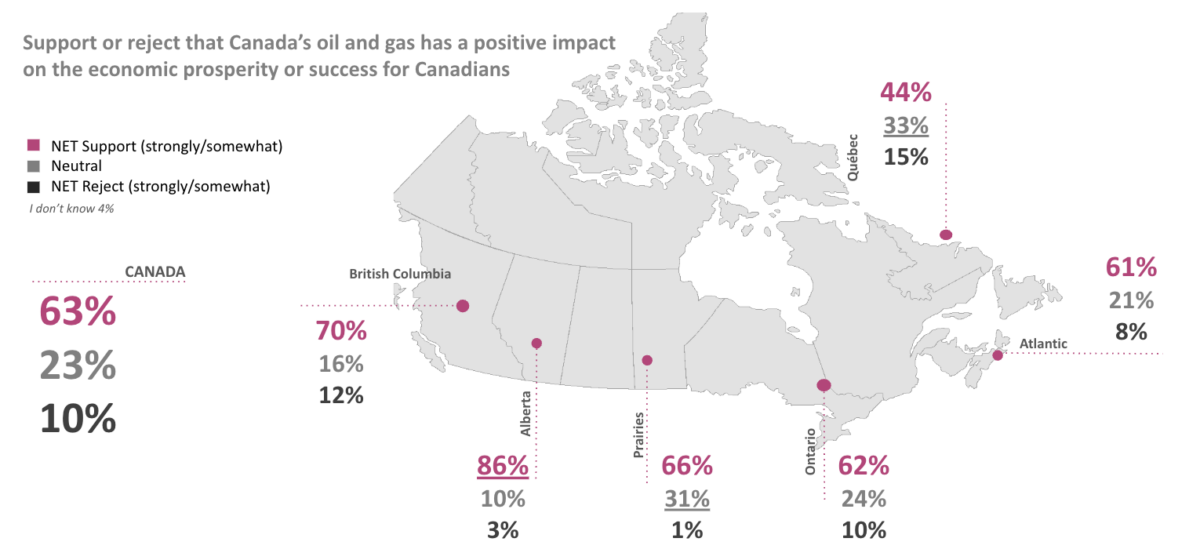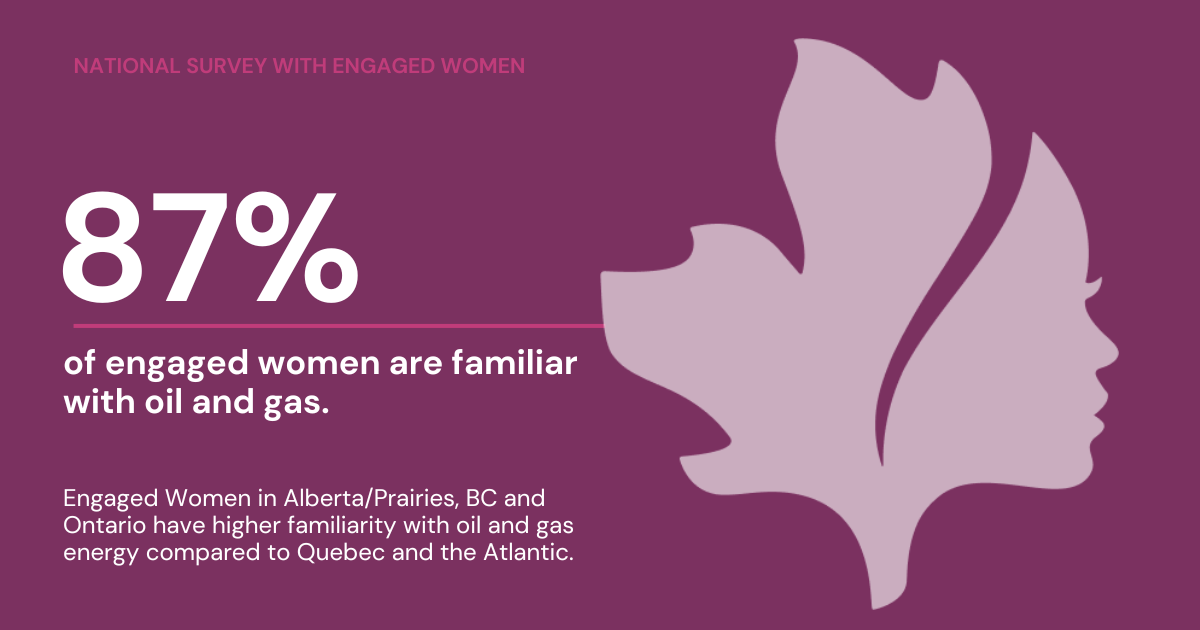There’s a headline you don’t read every day, so let’s pause for a moment and read it again.
United. Across Canada.
The headline captures a key takeaway from new research released by Leger, the largest Canadian-owned market research company in the country, on behalf of Canada Powered by Women (CPW).
Leger’s survey shows that a whopping 93% of engaged women consider it important to have an affordable, growing, and successful economy, and 69% believe Canada’s oil and gas industry positively affect the nation’s ability to achieve that.
This is a big moment for us.
Our group started meeting in 2019 to discuss issues that are important to us — namely that we believe prosperity is a top priority for Canadians, and the energy industry is vital to enabling this.
As we’ve grown, many women have told us they share our views. But this spring we asked Leger if they could help us determine — with statistical validity — just how many women feel the same way.
Here’s what the survey research revealed.
Who did we talk to? Meet, engaged women
First up, a definition: In the process of setting up our research we defined a group we are calling “engaged women.”
Canadian engaged women are 18 years of age and up; they read or listen to local, national or U.S. news; they are familiar with federal, provincial or municipal politics; they identified as being somewhat left to strongly right on the political spectrum; they’re interested in influencing government, as well as helping to solve issues Canadians face. Finally, engaged women are informed about the economy, and want to be part of creating a prosperous future for all.
Then researchers at Leger took a phased approach to quantify and qualify engaged women:
- Leger started with an omnibus survey of 1,500 Canadians to identify the market size of engaged women.
- Next, the research group ran focus groups to get a deeper understanding of engaged women.
- Finally, they surveyed 750 engaged women across the country between April 25 and May 7, 2023, to quantify the learnings.
From a statistical standpoint, the findings represent 24% of all women in Canada, and survey respondents were evenly split — half under 55 and half over 55 years of age. Our survey respondents are educated (four in five have a college certificate/degree or higher), and they live in a variety of locations — urban (44%), suburban (37%) and rural (19%).
The women surveyed represented a group deemed more likely to engage in public policy, vote in federal, provincial, and municipal elections, and participate in their community through both political and non-political action. The survey measured their key perceptions, interests, concerns, attitudes, and barriers to participating in energy conversations.
It found that these women are seeking facts, not opinions, and don’t want to be part of polarizing or politicized conversations.
Our country can feel divided in an election year, but a key finding of the Leger survey shows a high level of unity across Canada among engaged women and their beliefs on the economy and energy. Just look at the numbers when it comes to engaged women supporting the notion that Canada’s oil and gas sector has a positive impact on the economic prosperity or success for Canadians:

Canada Powered by Women Survey results
“We see good alignment across Canada,” says Paige Schoenfeld, Senior Vice President at Leger. “Almost all women polled cited a variety of benefits that Canadian oil and gas brings to their families and communities, on an unaided basis. One of the biggest surprises was how closely aligned engaged women are on the high importance of a successful and affordable Canadian economy and energy security for Canadians.”
Of the topics explored, energy security ranked second in perceived personal importance, followed by climate change through global and greenhouse gas emissions.
Connecting the dots between energy and Canadian prosperity

The survey revealed that familiarity with oil and gas energy is high across all regions and provinces.
Nationally, 87% of engaged women are familiar with the oil and gas sector. And provincially it breaks down as follows:
- British Columbia: 91%
- Alberta and the Prairies: 92%
- Ontario: 89%
- Quebec: 82%
- Atlantic Canada: 76%
Beyond this, women also understand and agree that energy is connected to everything we love about Canada.
The survey found that most engaged women (86%) spontaneously identify some benefits of Canada’s oil and gas on an unaided basis, including economic benefits; job creation; transportation support; heating needs; and its essential connection to everyday lives.
And here’s where things get more interesting.
While identifying the benefits of oil and gas was common, only 43% of women rate themselves as informed when it comes to the contribution of oil and gas to Canada’s economy and prosperity.
“This is a bit of a contradiction,” says Schoenfeld. “The data shows that the unaided level of awareness with engaged women is high and they are informed, yet when women are asked to identify how informed they are on specific topics, they rated themselves low. What this tells us is there is clear opportunity to further inform and support engaged women on these specific issues. If done so, they are more likely to participate in these important energy conversations.”
Other barriers include many women considering it a sensitive topic (27%) and preferring to avoid arguments (26%).
These issues are complex, and engaged women recognize that while they are informed, there is much more to learn — which they are open to. They want a better understanding of the issues before they go deeper into conversation and share opinions and perspectives.
Another interesting takeaway: We asked engaged women how likely they would be to share opinions on what contributes to the economic success or prosperity of Canada, and only a third (37%) said they were “likely” to share their opinions beyond their immediate circle of family and friends.
This stat surprised us, but the survey suggests women are apprehensive to speak for fear of being negatively targeted, or having their views characterized as polarizing.
It turns out that anonymity and support from others is the missing ingredient in our national dialogue on prosperity.
When we asked the same question but indicated there would be support from others, or anonymity offered, the number of people who said they would be “very likely” or “somewhat likely” to share their opinions beyond their immediate circle of family and friends the total jumped to 69%.
This stat was the detail we’ve been looking for over the last four years, and it underpins our mission going forward.
We represent women who believe energy is a vital part of Canadian prosperity
We represent Canadian women who believe our energy industry is a vital part of the continuing prosperity of our country. Our goal is to inspire and facilitate bold conversations on energy transformation, mobilizing women as advocates and influencers of policy.
That is our role because women have told us they want a voice, and what they need to get more engaged is support and anonymity.
“The ongoing transformation of energy systems across the globe is complex but full of opportunity for Canada,” says Sue Riddell Rose, a founder and board member of Canada Powered by Women. “It’s imperative women play an active role in shaping a balanced and holistic approach. Done right we have so much potential to both build up the vibrancy of the Canadian economy and be a leader in global greenhouse gas emissions reduction now and in the future.”
Canada Powered by Women’s mission is to create that trusted space for women, empowering them to participate in the national energy transformation conversation and represent their points of view.
Women make up 50.3% of the Canadian population, and as our survey shows, there is a huge gap in energy policy and decision-making if their voices aren’t heard.
By providing a platform of engagement for women across Canada, we can serve as a non-political, collective voice for women that we will take to policymakers and government — driven by the unshakable belief that a better world is possible and we can help make it happen together.
Research Methodology
The survey data for the first phase is from Leger’s Omnibus Study, conducted online from March 10-13, 2023, among 1,500 Canadians.
The survey data from the third phase is from a study conducted online by Leger using the LEO panel, conducted from April 25-May 7, 2023, among 750 Women in Canada. The women who qualified identified as someone who reads/listens to the news, is informed on politics, believe to be somewhat left/in the middle/on the right, and is neutral or in agreement with the following: interested in influencing government, interested in learning about the future, interested in learning more about topics that could impact Canadians future wealth and prosperity, Canada needs to ensure Canadians have dependable and secure access to energy sources, open to understanding what I can do to support important issues facing Canadians, informed about how economic conditions will impact me and my family, I want to have a voice about the future of oil and gas vs. energy, Canada should play a role in global energy security, and changes made to oil and gas industry policies will impact other industries or business.
